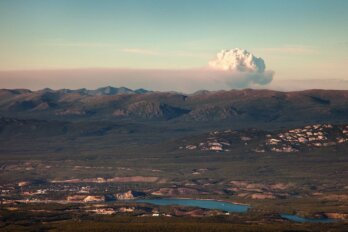On February 27, the European Union’s ninth parliament passed the Nature Restoration Law, committing member states to restoring at least 20 percent of “degraded” marine and terrestrial ecosystems by 2030. The law passed by 329–275 votes (with twenty-four abstentions), reflecting Europe’s ideological balance of power over the previous five years: mostly centrist, with a soft spot for the environment.
That soft spot just hardened. Europeans have elected a new parliament and, as expected, far-right politicians posted dramatic gains. They now occupy almost a quarter of the tenth parliament’s 720 seats: not enough to run the show, but sufficient to block any legislation they’re against—like the Nature Restoration Law.
In the immediate aftermath of the election, attention gravitated to more pressing developments. France’s president, Emmanuel Macron, called a snap parliamentary election after his Renaissance party was trounced by Marine Le Pen’s National Rally party. Germany’s chancellor, Olaf Scholz, faced pressure to do the same. Belgium’s prime minister, Alexander De Croo, confronted by his party’s terrible performance, resigned.
Europe’s right-wing populists have been gaining ground for years. This is often framed as an immigration-backlash story: Marine Le Pen has promised the French a referendum on strict immigration limits if they elect her president. Italian prime minister Giorgia Meloni, who spent the 1990s dabbling in neo-fascism, has called for a naval blockade of North Africa after over a million migrants have arrived in the country by sea over the past decade. In Germany, the success of the Nazi-adjacent Alternative für Deutschland owes much to the influx of almost 2 million refugees from wars in Syria and Ukraine; the party was recently caught secretly plotting the mass deportation of immigrants.
France, Italy, and Germany are three of the countries where the far right just did best, with a collective jump from thirty-seven to sixty-nine seats in the new EU. But immigration isn’t the only grievance fuelling their success. Another is the perceived cost of ecological protection. Meloni holds the EU’s aggressive decarbonization plans in the same regard as illegal immigrants. Le Pen has promised to take down France’s wind turbines and cancel all subsidies for renewable energy if elected. Support for Germany’s AfD is strongest in the country’s coal-producing region, where plans to phase out coal by 2038 (and possibly sooner) are about as welcome as the carbon tax in Alberta.
The Greens suffered some of the continent’s worst losses, dropping from seventy-one to fifty-three seats. (At the time of publication, Ireland has not yet finalized its results.) According to the European Council on Foreign Relations, a prominent think tank, this means “the biggest policy implications of the 2024 European Parliament elections are likely to concern environmental policy.”
Until now, environmental protection has been a rare point of (relative) agreement among the EU’s dominant centrist coalitions. The outgoing parliament was elected at the height of global climate concern in 2019, and climate-focused candidates did well across the continent. One of their first acts was to pass the European Green Deal, an ambitious emissions-reduction law that accelerated renewable-energy production and helped push Europe’s emissions down to their lowest levels in sixty years.
But Europe’s cost of living has followed the opposite trajectory. Far-right politicians have seized on this correlation, casting environmental protection as a financial drain on working people. “No heater is illegal,” reads one AfD slogan in Germany. “We cannot help the environment by destroying our industries,” Meloni said last year, after reneging on an EU commitment to stop financing international fossil fuel projects. In addition to being Italy’s prime minister, Meloni is president of the EU’s largest far-right bloc, the European Conservatives and Reformists (ECR) party.
That doesn’t mean Meloni and her colleagues are going to take control of Europe. But they now have greater influence on the centrist parties that still hold the most seats, a power the ECR has lacked until now.
For a sense of how this will translate into policy, consider the tortured trajectory of the Nature Restoration Law. A key pillar of the Green Deal, much of it focuses on rehabilitating carbon sinks like forests and peatlands, which have been cleared and drained across much of Europe—for instance, the law requires member states to restore organic soil by 2030 in 30 percent of drained peatlands that have been converted to agriculture. It’s no surprise this was fiercely opposed by the EU’s influential agriculture lobby when the law was first proposed in 2022. That lobby secured the support of Europe’s largest party, the centre-right European People’s Party, which is now even larger than before; the EPP gained ten seats in the new parliament for a total of 186, making it by far the weekend’s biggest winner.
The EPP is also the party to which the president of the EU Commission, Ursula von der Leyen, belongs. Von der Leyen, who looks poised to keep her job, was and remains a major supporter of the EU’s Green Deal; she called it “Europe’s ‘man on the moon’ moment,” back in 2019, when the legislation was being proposed. But she kept silent while her party joined forces with the agricultural opponents to the Nature Restoration Law to campaign against its passage. That campaign blended blatant misinformation with genuine concern for the well-being of farmers, who clearly are directly affected by the law. On social media, the EPP mused that the Nature Restoration Law would “turn the entire city of Rovaniemi”—the supposed birthplace of Santa Claus—“into a forest.” The party also suggested the law could force farmers out of business and spark a “global famine.”
Over the next year, negotiators worked farm-related exemptions into the law, including the option to postpone reclamation targets in the event of “severe EU-wide consequences for food security.” Even so, opposition remained fierce. Von der Leyen’s party came within a hair of forcing its rejection, more than once, before the watered-down version finally passed in February. “We’ve never seen such an aggressive campaign against a legal proposal coming from the [EU] commission,” Sabien Leemans, a senior biodiversity policy officer at the World Wide Fund for Nature EU, said in an interview with Carbon Brief the next day. “It was really putting the Green Deal in jeopardy because the nature restoration law is the biodiversity pillar of the Green Deal.”
Leemans added that, in her view, the EPP was “doing the opposite” of protecting farmers. “Agriculture needs healthy soils, needs water retention, needs flooding and drought prevention, pollination, and all this depends on healthy ecosystems,” she said. “It’s very cynical to tell people that you’re defending farmers and actually blocking one of the solutions for farmers.”
This whole saga illustrates the dynamics underpinning almost every battle between environment and climate on the one hand and agriculture and industry on the other. In almost every case, short-term costs are weighed against long-term benefits. And now that the EU has lurched rightward, both the Nature Restoration Law and the Green Deal are in significant peril.
One of the EU parliament’s main levers of power is cash. It holds the continent’s purse strings. The previous parliament allocated one third of its budget to climate spending, amounting to just under $100 billion per year. It’s hard to imagine the new EU parliament spending that kind of money on a cause it no longer believes in.
And the nature law is in even worse shape. Despite having passed in February, it still needs to be formally ratified by the EU Council (comprised of the EU’s heads of state, the president of the commission, and the president of the council) before coming into force. That’s usually a formality, but not this time: after a number of countries indicated they would refuse to approve the law (a European parallel to Canadian provinces refusing to implement the federal carbon tax), the council delayed its ratification vote indefinitely.
This takes the dispute beyond straightforward policy disagreements and into the realm of democratic threat. Implementing laws passed by the EU’s parliament, no matter how unsavoury, is a cornerstone of the EU itself. Ultimately, the threat extends even further: the Nature Restoration Law is itself an outcome of international commitments made by EU negotiators at the UN’s historic COP 15 biodiversity summit, hosted by Montreal in December 2022. Canada and almost 200 other nations made the same “30X30” commitments to protect 30 percent of their land and water by 2030.
Europe’s dynamics echo those in North America with astounding precision. The main difference is that the EU doesn’t produce much of its own oil and gas, whereas North America leads the world in fossil fuel production. But Canada and the US have made progress under their respective Liberal and Democratic governments; these environmental gains are unlikely to survive should the Conservatives in Canada and Republicans in the US win the upcoming elections. On the climate front, Donald Trump’s Republicans will do everything they can to shred Joe Biden’s Inflation Reduction Act; Pierre Poilievre’s Conservatives are likely to give Justin Trudeau’s Emissions Reductions Plan the same treatment, starting with the carbon tax. This trickles all the way down to regional politics. Consider British Columbia’s impending October election: on Canada’s west coast, a newly invigorated Conservative Party of BC is rocketing upward in the polls and now poses a genuine threat to the incumbent NDP. John Rustad, the BC Conservative leader, recently promised to axe not just the province’s carbon tax but also BC’s commitment to protect 30 percent of the land base by 2030. “What are we going to do if we have 30 percent less food production?” he asked The Narwhal. “What are we trying to achieve here as a province?”
In a globalized world, nearly identical conversations are being held in every hall of power, from national seats in Ottawa and Washington, DC, to continental forums like the one in Brussels. With almost every election, conservatives of many stripes are increasing their control over the entire Global North.
Environmental protections aren’t the only things to worry about. But they’ll probably be the first to go.
With thanks to the Trottier Foundation for helping The Walrus publish writing on climate change and the environment.






